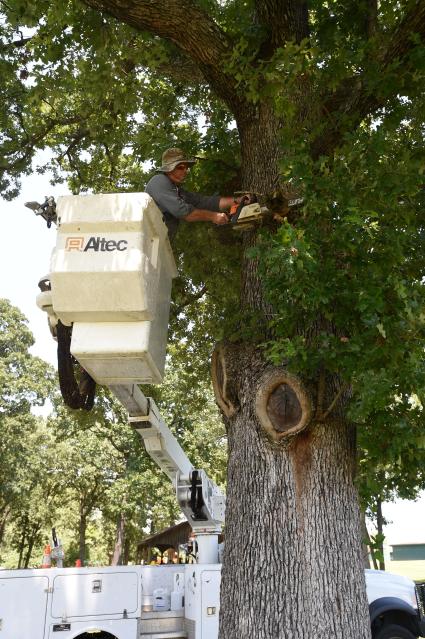GMO salmon, Tinder health, foundation fixes: News from around our 50 states
Alabama
Homewood: Historic preservationists are trying to save a nearly century-old home near Birmingham with ties to the late authors Ernest Hemingway and F. Scott Fitzgerald. The Alabama Historical Commission has added the 1921 home, known by many as the “Pink House” for its distinctive color, to its “Places in Peril” list for 2019. Once owned by a Jazz Age sculptor and his wife, the house became a gathering spot for the rich and famous. A news release from the commission says visitors included Fitzgerald, Hemingway and the grand duchess of Russia. A developer bought the property two years ago with plans to demolish the house and build five new homes. The Homewood Historical Preservation Society says the “Pink House” could be demolished within months.
Alaska
Fairbanks: Some area beekeepers believe there is a connection between pesticides and an increase in honeybee deaths. The Fairbanks Daily News-Miner reports beekeepers and other residents have asked the Fairbanks North Star Borough Assembly to pass an ordinance banning specific pesticides. The assembly says the borough can investigate but does not have the authority to regulate pesticide sprays. At least one beekeeper at a meeting last week singled out bifenthrin and deltamethrin, insecticides that are legal in the U.S. but must be certified for use on Alaska properties. Beekeepers say pesticides can drift between different properties if multiple pest elimination services are spraying in the same area. One hive owner says after nearby spraying, some of her bees died, while honey was discolored, and wax was unusually thick.
Arizona
Yuma: Yuma County officials say it’s not too late to save dark skies enjoyed by residents of rural areas separated by a mountain range from the Yuma area where urban lights obscure views of stars and planets. The county in southwestern Arizona is considering adopting an ordinance to impose new restrictions on outdoor lighting despite concerns that it could result in lawsuits by property owners. The Yuma Sun reports that the county Board of Supervisors decided last week to pursue adoption of an ordinance, with Supervisor Darren Simmons saying he agrees with the many constituents who have told him they want more regulation of outdoor lighting.
Arkansas

Mountain Home: The City Council has passed an ordinance regulating the planting and maintenance of trees within the city’s parks, the first step on the road to getting Mountain Home recognized as a Tree City USA municipality. The Arbor Day Foundation’s Tree City USA program, co-sponsored by the National Association of State Foresters and the USDA Forest Service, recognizes communities for their forestry efforts. It includes more than 3,400 cities and military bases in all 50 states. The Arbor Day Foundation also awards matching grants to cities to perform forestry-related projects. The ordinance approved by the City Council last week creates a five-member tree board of Baxter County residents who will draft and administer a written plan for the preservation, planting and removal of trees.
California
Ventura: Late summer in Ventura County means 12 days of agricultural displays, fried foods and head-spinning rides at the county fair. The Ventura County Fair begins Wednesday and runs daily through Aug. 11. On Aug. 1, 5, 6 and 8, fairgoers can purchase $35 wristbands good for unlimited carnival rides until 7 p.m. Opening day Wednesday is Dollar Day, with admission just $1 until 3 p.m., and specialized discounts and free tickets for certain groups are available on several other days. Styx, Martina McBride and Melissa Etheridge are among performers scheduled to entertain fairgoers for free. More information is available online at www.venturacountyfair.org.
Colorado
Frisco: Transportation officials say ridership on the state bus service is exceeding expectations as the service marked its fourth anniversary this month. The Summit Daily reports Bustang has recorded more than 238,000 riders in 2018-19, continuing to grow from the more than 102,000 riders recorded in the service’s first year. Bustang program manager Mike Timlin says the number of passengers has continued to outpace what the state Department of Transportation plans for each year. The service is planning more expansion, starting with weekend pilot routes in the fall from Denver to Estes Park and Rocky Mountain National Park. It aims to launch services to Pueblo and the Interstate 70 corridor in December. Timlin says Bustang also is recruiting resorts for seasonal direct routes to ski areas.
Connecticut
Vernon: After worrying for years about the foundations crumbling beneath their houses, hundreds of suburban homeowners are getting help from the state to salvage their properties that had been doomed by bad batches of concrete. The homes are being lifted, propped up into the air and held there as workers jackhammer away concrete that had deteriorated due to the presence of a naturally occurring but corrosive mineral. New foundations are poured, and after six to eight weeks of work, the houses are ready to live in once again. This process is expected to continue for years. These feats, made possible by financial assistance from the state and a fee on homeowners’ insurance policies, are also rebuilding communities and the lives of residents, including some who’d considered just walking away from their houses and mortgages.
Delaware
Wilmington: New Castle County has been cracking down on tax-delinquent properties for much of the past year, but many parcels that owe the most in back taxes have not been the county’s priority. Not among the most-wanted tax scofflaws was Newark Country Club, which owes over $500,000 in property taxes, more than $400,000 of which is delinquent. Neither was an industrial automotive property in Wilmington’s Southbridge neighborhood, which last month owed $109,000. Nor was a shuttered Catholic church in Wilmington’s northside owned by a development partnership that owed about $90,000 until last week, when the liability was paid following questions from the Delaware News Journal.
District of Columbia
Washington: After a D.C. summer jobs program was abruptly shut down, its former director says no one had discussed any complaints with him. The Washington Post reports the Amy Jacques Garvey Institute, which provided summer jobs for predominantly black teenagers and young adults, closed weeks ago to the surprise of Director Kendall Bryan. The Department of Employment Services told Bryan last week that his “inappropriate” remarks were causes for closure. He was accused of using foul language and making a youth described as the “only non-African American” enrollee uncomfortable after saying the program benefits black youth. Bryan said he may have used a profanity when breaking up a fight this year, but he dismissed the other allegation as “poppycock.” Officials said they would reassign enrollees.
Florida
Tallahassee: A judge has struck down a state law that threatened city and county officials with penalties if they approved gun regulations tougher than state laws. Leon County Circuit Judge Charles Dodson said late Friday that lawmakers can prohibit local regulation of firearms, but penalizing local officials for passing stricter laws is unconstitutional. Florida has barred cities and counties from passing gun laws stricter than state laws since 1987, but lawmakers in 2011 approved penalties for local governments and officials, including fines of up to $5,000 and removal from office. Members of the public could receive damages up to $100,000 and attorney fees if they successfully sued. Local officials challenged the law in 2018 after the massacre at Marjory Stoneman Douglas High School.
Georgia
Atlanta: An African elephant that spent a decade at San Diego Zoo Safari Park has moved across the country to a new home at Zoo Atlanta. The Union-Tribune reports 30-year-old Msholo arrived last week at the Zambezi Elephant Center. Msholo and two female African elephants, Kelly and Tara, will be the main attractions at Zoo Atlanta’s new African Savanna habitat, which opens Aug. 8. Msholo was brought to the U.S. from Swaziland in 2003. He arrived in San Diego in 2009 with the hope that he would breed with female elephants there. But he never fathered any offspring in California. Zookeepers say they’re hopeful that new terrain and new companions in Georgia will increase Msholo’s chances of breeding and contributing to the survival of the species.
Hawaii
Honolulu: Protests against construction of a giant telescope have halted work at existing observatories on the Big Island. Hawaii News Now reported Sunday that workers at other facilities on the dormant Mauna Kea volcano have been denied access by demonstrators opposed to the Thirty Meter Telescope. Officials say 13 telescopes at the Mauna Kea Observatories have led to breakthroughs in astronomy for more than 40 years, including the first photo of a black hole and the discovery of the first interstellar object in space. Scientists say the two-week closure of the access road leading to the summit has resulted in the potential loss of a year’s worth of discoveries. Demonstrators oppose construction of the Thirty Meter Telescope, which they say could further damage land considered sacred by some Native Hawaiians.
Idaho
Boise: Mayor David Bieter says the city will not use facial recognition technology to identify people banned from City Hall after criticism over the plan. The Idaho Statesman reports Bieter’s office said Friday that the city will not proceed with a $31,000 contract with Meridian-based CompuNet that he had authorized. Lauren McLean, who is challenging Bieter in November, had said the decision to use the technology was a “step backward” and a disappointment for those who want more transparency from local elected officials. Bieter administration officials had argued that using the technology would act as a security measure for the public-facing employees at City Hall. No one is currently banned from City Hall.
Illinois

Chicago: Lincoln Park Zoo will remain free to all until mid-century under an agreement zoo operators reached with the city’s park district. The Lincoln Park Zoological Society, which operates the zoo, and the Chicago Park District, which owns the zoo’s land and buildings on the city’s North Side, extended their operating agreement to Dec. 31, 2049. Zoological society CEO Kevin Bell says keeping the zoo free is a great thing for the city and for people visiting Chicago. The zoo has its origins in 1868 with a gift of swans. With about 3.42 million visitors in 2018, Lincoln Park is by far the most popular of Chicago’s museums and nature parks. Of the others, only Shedd Aquarium and Brookfield Zoo approached the 2 million-visitor threshold last year.
Indiana

Albany: Ten miles north of Muncie, a new 40-acre farm is busy with work day and night. What’s being grown there, though, isn’t what most would likely expect from Hoosier farm country. Just outside Albany, the gate-restricted, mostly inconspicuous facility owned by AquaBounty Technologies is one of few aquaculture farms in the state. Indoors, thousands of salmon swim within large, 70,000-gallon tanks. But a new, brimming batch of eggs is different from those already swimming around. Growing at twice the rate of wild salmon, these are the first genetically engineered animals deemed safe to eat by the U.S. Food and Drug Administration. Their existence in Indiana also marks the first time a genetically modified food animal will be raised and sold in the United States.
Iowa
Des Moines: Public health officials are using online services like Tinder and Grindr to find and warn people who may have been exposed to sexually transmitted diseases. “I have information that you may have been in contact with someone diagnosed as having a serious illness,” one of the standard messages reads. “It is very important you contact me to discuss this.” Shannon Wood, a disease intervention specialist for the Iowa Department of Public Health, often sends such messages via Facebook and other online services people use to meet each other. From 2010 to 2018, the number of Iowa chlamydia cases jumped 39%, to 14,685. Gonorrhea cases soared 168%, to 4,839, and syphilis cases went up 316%, to 283, the state health department reports. Last week, it warned that those rates continue to soar, with chlamydia cases climbing nearly 10% so far in 2019, and gonorrhea rates up nearly 15%.
Kansas
Abilene: A museum honoring President Dwight Eisenhower in his childhood home has reopened after undergoing a massive, yearlong renovation. Visitors got their first glimpse Monday of modernized exhibits in the 25,000-square-foot museum. They feature new graphic panels, display cases, theater experiences and digital interactive stations. The original schedule was to open in time for the 75th anniversary of D-Day in early June, but the federal government shutdown delayed the timeline. During the work, museum exhibits were moved to the library portion of the 22-acre complex. It also includes the home in which the future president and supreme commander of the Allied forces during World War II spent most of his childhood. The formal dedication is planned for Oct. 12 to coincide with Ike’s birthday weekend.
Kentucky
Lexington: Before classes begin, schools across the state are working to fulfill a new law requiring the national motto “In God We Trust” to be displayed in a prominent place. The Lexington Herald-Leader reports some districts, including Jessamine and Franklin, have put up plaques, while some, including Jefferson County Public Schools, plan to use artwork in common areas. Others, including Woodford County, are still working out details. Lead sponsor Republican Rep. Brandon Reed has said the motto is ever-present in society and is prominently displayed in the state Legislature. The American Civil Liberties Union opposed the bill, saying the motto “has the appearance of endorsing religion.” ACLU Communications Director Amber Duke says parents or students who feel their rights have been violated should contact the organization.
Louisiana

New Orleans: A new television show featuring local chef Isaac Toups is slated to launch this week. The show, dubbed “Kitchen Takeover,” will air on the Food Network and feature Toups traveling around the country and helping failing restaurants and food-related businesses to get back on track. In a news release, Toups invited people to watch the “big friendly Cajun try to help some good people out of some sticky situations.” The first show airs Saturday, Aug. 3. Toups is the chef and owner of Toups Meatery and Toups South. He also has a cookbook celebrating his love of the Cajun culture and cuisine of his childhood.
Maine
Portland: It’s a slow lobster season so far, but fishermen are still hopeful it’ll be a good one. The harvest of crustaceans in America’s biggest lobstering state is usually in full swing by July, but fishermen say they haven’t caught much this month. The season tends to pick up after many lobsters shed their shells and reach legal size. Fishermen say that hasn’t happened yet. But the slow season isn’t resulting in high prices. Consumers are paying about what they did last year. The slow start also means a bait shortage hasn’t caused much worry. Maine typically accounts for about 80% of the nationwide lobster haul. Catches this decade have been much higher than any in the state’s history. The haul peaked at 132.6 million pounds in 2016 and nearly topped 120 million pounds last year.
Maryland
Frederick: A gun rights advocacy group is challenging the state’s concealed carry gun laws. The Frederick News-Post reports that the lawsuit has been filed against the state’s Handgun Permit Review Board. A brief has been filed in the Maryland Court of Special Appeals contending that the state’s laws are unconstitutional and have been superseded by other case precedents. The brief was filed by Maryland Shall Issue, a gun rights organization. The Court of Special Appeals is Maryland’s intermediate appellate court. Under Maryland law, a state resident must provide a “good and substantial reason” to be granted a concealed carry permit. Maryland is one of 10 states considered a “may issue” state. That means it requires a permit to carry a concealed gun. Granting that permit is at the discretion of local authorities.
Massachusetts
Cambridge: An association of black students at Harvard Law School says the university “woefully failed to act” after four students received offensive emails and text messages from an anonymous sender. The Harvard Black Law Students Association issued a statement Friday criticizing the school after it was unable to determine who sent the “hateful, racist and sexist” messages and after officials refused to share details of an investigation with students who received the messages. Four students, including two who are black, notified school officials this year that they had separately received messages with comments including “we all hate u,” “you know you don’t belong here” and “youre just here because of affirmative action.” Harvard officials say a variety of investigators have been unable to determine who was behind the messages.
Michigan
Traverse City: The Great Lakes Shipwreck Historical Society has discovered the remains of a ship that sank 103 years ago in Lake Superior off Michigan’s Upper Peninsula. The society announced this month that it found the wreck of the 294-foot S.R. Kirby near the Keweenaw Peninsula last year. WWTV/WWUP-TV reports that Great Lakes Shipwreck Museum executive director Bruce Lynn says the Kirby left Ashland, Wisconsin, in calm weather on May 7, 1916. But the following day, as the vessel neared Eagle Harbor, the winds picked up to 76 mph. A huge wave took the Kirby down with 22 men aboard. Two men and the captain’s dog survived. Lynn says that the ship took about a minute to sink and that the wreck resembles an “explosion on the bottom of the lake.”
Minnesota
Minneapolis: Motorists will be required to use hands-free devices if they want to talk on the phone while driving. Slower drivers must move over to let faster drivers pass. Groping a person’s clothed buttocks without consent will become a crime. And vaping in public indoor spaces and workplaces will become as illegal as cigarette smoking in them. That’s just a sampling of the new laws that become effective Thursday in Minnesota. In other changes, residents of assisted living homes and their families will now have the right to install hidden monitoring cameras for two weeks before being required to notify the facilities. And certain parents who have lost their parental rights will have a little easier time trying to get them back.
Mississippi

Biloxi: Officials along the Mississippi Gulf Coast are reopening discussion of a new east-west connector linking the coast’s two largest cities. Local news outlets report Gulf Regional Planning Commission Executive Director Bill Gavin told business leaders it could cost more than $300 million to build a 12.6-mile, tree-lined parkway connecting Gulfport and Biloxi. The corridor would carry vehicles, include rapid bus service, offer a walking and bike path, and maybe have room for a light rail transit line. Gavin says the idea is to cut the project into segments, to make it more affordable. Plans call for building the road parallel to CSX railroad tracks, but not replacing them, as once was proposed following 2005’s Hurricane Katrina. The corridor could displace hundreds of businesses and residents. Gavin promises “epic public outreach.”
Missouri
Easton: Experts have begun restoring and re-erecting fallen headstones at a 150-year-old burial site. Tim Wiedmaier discovered the abandoned Kessler Cemetery in 2008 when he was searching for his great-great-great-grandfather’s headstone, which took him three tries. Community activist Mary Bray was one of the first helpers to clear away the brush and says she realized they needed professional help. The St. Joseph News-Press reports that Jacob’s Ladder Cemetery Restoration Specialists began refurbishing and standing up about 40 stone tablets a few days ago. There are 73 grave burials in the cemetery. The caretaker and treasurer for the old Kessler Cemetery, Michael Fisher, says he tried raising $9,000 for a complete revamp, but about $2,000 in donations is still needed to meet that goal.
Montana

Great Falls: United Way is gearing up for its annual Stuff the Bus school supply drive Aug. 8. Last year, the nonprofit gathered more than 15,000 items that were given to local kids through the school district and local nonprofits including Boys & Girls Club, the Children’s Receiving Home and the Rescue Mission. Businesses, churches, civic groups and families interested in gathering supplies ahead of the event can find supply lists, posters and other information on United Way’s website. Roughly 200 volunteers are needed to help sort donated items and to hand out school supply lists to shoppers. Volunteers can work one or more hourlong shifts. Interested volunteers should contact jbriggs@uwccmt.org. More information is available at www.volunteergreatfalls.org.
Nebraska
Omaha: The University of Nebraska Medical Center has received a five-year, $3.7 million grant to address the looming shortage of doctors who specialize in the care of older adults. The U.S. Health Resources Services Administration estimates a need for 33,200 geriatricians in the U.S. by 2025 – roughly 27,000 more than the current projected supply of about 6,200. The medical school says a way to solve the problem is to expand the access of primary care professionals to resources that aid them in treating older adults’ complex health issues. The grant will provide education to teams including physicians, nurses, nurse practitioners, physician assistants, mental health professionals and social workers. The idea is to care for patients as a team when they’re sick but also keep them well.
Nevada

Silver Springs: Crews have completed work to reinforce and preserve the historic adobe ruins of the state’s first and largest military outpost as part of a two-year effort to improve and expand the state park system. Fort Churchill was built in 1861 about 30 miles northeast of Carson City to provide protection for early settlers and guard Pony Express mail runs. It was abandoned in 1869. Then-Gov. Brian Sandoval announced in 2017 that more than $13 million would be devoted to an initiative to finance repairs and create two state parks. Park Supervisor Scott Egy told the Mason Valley News officials have been concerned about the deteriorating walls at the fort for 15 years but didn’t have any money for repairs. Thanks to the initiative, the work was completed in June.
New Hampshire
Moultonborough: Two women plan to swim around an island in the Granite State to help raise money for loon conservation. Swimmers Brenda Gallagher and Pam Halsey are taking part in the second annual Winni Swim on Aug. 8. They will swim around Ragged Island to raise money for the Loon Preservation Committee’s work to protect loons in New Hampshire. Participants can register to swim or paddle along with the swimmers. After the swim, there will be a presentation on the history of loons on Lake Winnipesaukee and a guided tour of Ragged Island. The island swim is part of a larger goal that Gallagher and Halsey have of swimming around all 258 islands in Lake Winnipesaukee that don’t have bridges.
New Jersey
Trenton: A new state law will make the process more difficult for municipalities seeking changes in their form of government. NJ.com reports that the bill signed into law last week by Lt. Gov. Sheila Oliver changes the minimum number of required voter signatures to replace a municipality’s form of government. Signatures for such measures must now constitute 25% of the total votes cast in the town during the last General Assembly election. Before, only 10% of the previous election votes were required. The measure also requires a supermajority, or two-thirds, of the governing body to approve placing the question on the ballot. The bill supersedes the Mount Laurel Township council’s effort to change from a partisan form to nonpartisan and move the election from November to May.
New Mexico
Santa Fe: A state commission’s decision may reopen private waterways to recreationists. The Santa Fe New Mexican reports the New Mexico Game Commission last week handed fishermen and other recreational boaters a partial victory by temporarily halting a program for private property owners. Under the 2017 program, private property owners have say over whether the public can access waterways on their land. The current commission, appointed by Gov. Michelle Lujan Grisham, decided Wednesday to impose a 90-day moratorium on the rule until it can receive advice from Attorney General Hector Balderas as to whether it is legal under state law. A previous commission, appointed by then-Gov. Susana Martinez, implemented a program in 2017 that allowed landowners to certify rivers and streams that cut through their property as “non-navigable.”
New York
Albany: The governor signed a bill Monday that softens penalties for possessing small amounts of marijuana and allows for the expungement of some past offenses. The law changes an unlawful possession of marijuana statute into a violation that’s similar to a traffic ticket, instead of a criminal charge. Under the new law, the maximum penalty is $50 for possessing less than an ounce of pot and a maximum of $200 for between 1 and 2 ounces. The law also requires that records tied to low-level marijuana cases be automatically sealed and creates a process for expungement. It will take effect in 30 days. “Communities of color have been disproportionately impacted by laws governing marijuana for far too long, and today we are ending this injustice once and for all,” Gov. Andrew Cuomo said in a statement.
North Carolina
Greensboro: The city will use federal grant money to help it inventory homes, churches and public buildings designed and built by African Americans. The News & Record reports Greensboro has received a $12,000 Historic Preservation Fund grant for the project. The city also is spending $10,000 on the project. City senior planner Mike Cowhig says state officials have suggested Greensboro do a comprehensive survey of buildings associated with African American designers and buildings because some communities are underrepresented in historic preservation. The city says the first phase will focus on modernist structures in eastern Greensboro and Benbow Park that were designed by African American architects. He says the city likely will survey the public for more information about historically significant buildings.
North Dakota
Medora: A teenage visitor to a national park has been injured by a bison. Officials at Theodore Roosevelt National Park say the 17-year-old girl from Colorado was on a trail Saturday and walked between two bull bison that had been fighting. One bison charged the teen. She was struck in the back, gored in the thigh and tossed about 6 feet into the air. Park rangers and Billings County paramedics treated the girl at the scene until she could be taken by helicopter to a Bismarck hospital. Authorities say the teen’s condition is stable. Park regulations require that visitors stay at least 25 yards away from large animals such as bison, elk, deer and horses.
Ohio

Middletown: The Ron Howard-directed movie “Hillbilly Elegy” will film for a few days in this city where most of the book is set. The Hamilton-Middletown Journal-News reports Andy Lipschutz of the movie production company says some 125 people will be involved in shooting that begins Aug. 5 in Middletown. Local native J.D. Vance wrote the 2016 best-selling, colorful memoir about growing up in a struggling family. He was interviewed often that year for insights about white working-class people who supported Republican presidential nominee Donald Trump. Howard made multiple visits to the steel-mill city some 25 miles southwest of Dayton. Stars Glenn Close and Amy Adams were also spotted with him as he scouted locations for the Netflix movie, most of which is being filmed in Georgia.
Oklahoma
Oklahoma City: Officials say that there is no longer a need to detain migrant children at an Army base in the state and that preparations to house them there have stopped. Evelyn Stauffer, a spokeswoman for the U.S. Department of Health and Human Services Administration for Children and Families, said in a news release Saturday that the decision to stop the preparations at Fort Sill was made because there has been a decrease in the number of unaccompanied migrant children coming into the U.S. Donelle Harder, a spokeswoman for Gov. Kevin Stitt, says the White House notified Stitt of the change but said Fort Sill could still be used if the number of children coming into the country rises again. The base about 80 miles southwest of Oklahoma City was used to house Japanese Americans during World War II and Apache prisoners of war from 1894 to 1910.
Oregon
Bend: Some local business owners say downtown events that close streets and parking are affecting their ability to do business, and they’re asking city officials to consider moving certain events. The Bend Bulletin reports restaurant owner Steven Draheim watched his sales diminish during the culinary street event “Bite of Bend.” Draheim got his own food truck and operated it two blocks from his brick-and-mortar business. But on a summer weekend, he would prefer that people come into his restaurant instead of food trucks in front of it. He says there’s a perception that events are bringing in more business, but they’re actually keeping people away. Event organizers say alternative spaces are hard to come by, and there’s value in bringing people together in the downtown core.
Pennsylvania
Harrisburg: Gov. Tom Wolf is warning that food stamp benefits for about 200,000 people are jeopardized by a Trump administration move to stop allowing states to exceed federal income eligibility thresholds. Wolf said Monday that such a change would primarily affect the elderly, the disabled and lower-income families. He also says it’ll result in fewer school lunches. In Pennsylvania, more than 1.7 million people are in the Supplemental Nutritional Assistance Program. Current federal guidelines forbid people who make more than 130% of the poverty level from getting food stamps. But most states bypass the limits under a federal policy that allows people who receive benefits through other government programs to automatically qualify for SNAP. The Trump administration seeks to end that policy.
Rhode Island
Providence: The state is offering $4 million in grants to help communities and local groups protect open space. The Rhode Island Department of Environmental Management announced the availability of the grants Friday, through the Open Space Grant Program. The funding is provided through green economy bonds approved by voters in 2016 and 2018. The deadline to apply is Oct. 25. Gov. Gina Raimondo says preserving open spaces is critical to building resiliency against the impacts of climate change. Awards up to $400,000, which can cover up to half of the project cost, will help preserve lands offering significant natural, ecological or agricultural value through a direct purchase or conservation easement.
South Carolina
Fort Jackson: Recently released federal data shows that more than 16% of the drinking water wells tested near Fort Jackson over the past six years have shown contamination from a toxic chemical found in hand grenades used at the military installation to train soldiers. The State reports in some cases, the pollution levels are high enough to exceed federal safety advisories for RDX – a chemical that can cause seizures and cancer in people from long-term exposure. Fort Jackson officials say they’ve taken measures to prevent RDX from flowing toward private wells, including treating soil with lime to neutralize the chemical. In addition, the base has supplied bottled water and installed water filtration systems to keep it out of tap water.
South Dakota
Rapid City: Federal authorities say people who became sick after working at a uranium ore-buying station more than 60 years ago may qualify for compensation. The Rapid City Journal reports that workers who served at the station in Edgemont between 1952 and 1956 may have been exposed to toxic materials. Miners sold ore to the government during the Cold War for nuclear weapons. The federal Energy Employees Occupational Illness Compensation program is paying workers who fell sick from exposure to toxic materials and radiation. Surviving family members are eligible for compensation. The program has already paid $10.37 million to 120 South Dakota workers. It offers lump-sum payments of $150,000, plus medical expenses, or people can qualify for a cap of $250,000 for wage losses, impairment benefits and medical expenses.
Tennessee
Nashville: A prosecutor who has come under fire for making anti-gay remarks now faces calls to have his law license immediately suspended. A coalition of Tennessee attorneys submitted the letter Monday, asking that Coffee County District Attorney Craig Northcott’s competency to practice law be investigated and that he be required to reaffirm his oath as an attorney. A complaint was filed against Northcott earlier this year after video footage surfaced of him saying gay couples shouldn’t receive domestic violence protections, arguing that such laws are designed to protect the “sanctity of marriage.” Northcott has since argued that he has “strongly held religious beliefs” that same-sex relationships are sinful and will not do anything to suggest he agrees “with such behavior.”
Texas
Austin: No cash? No problem. The city is launching a pilot program that will let fans digitally tip their favorite musicians. The Austin American-Statesman reports the city is providing 10 artists with a DipJar, a device that enables fans to tip musicians using a credit or debit card. The chosen artists will test the technology for six months. They can collect tips at local live shows or on tour. City officials say they hope the program will financially help local musicians and the city, which draws visitors due in part to its internationally known music scene. Mat Oldiges, leader of the Human Circuit, one of the groups selected, says while tips are fewer than before, he believes fans still want to help artists but may “just need that little extra motivation and access.”
Utah
Park City: Olympic Park has announced an $11 million expansion to renovate training facilities and strengthen the state’s bid to host a second Winter Olympics. The Salt Lake Tribune reports that officials said at a groundbreaking ceremony last Tuesday that the project will add as many 10 new ski runs over the next five years, including some that will be world class level. The changes at the Park City site are part of a series of improvements in the works and planned at facilities used in the 2002 Winter Olympics in Salt Lake City. Utah Olympic Legacy Foundation CEO Colin Hilton said the improvements will also help recruit people who want to learn how to ski and snowboard. Salt Lake City is hoping to be selected to host the 2030 Winter Olympics.
Vermont
St. Johnsbury: A group working to bring high-speed internet services to the state’s most remote region says two communications districts could be set up in the coming years to provide that service. The Caledonian Record reports the plan would create a communications district that would allow towns to share services. Any financial liability would be placed on the district rather than any one municipality. The plan by the Northeast Kingdom Collaborative builds on discussions at a June meeting on broadband issues. Northeast Kingdom Collaborative Director Katherine Sims says a draft map for the districts covers 55 cities and towns, with 24 in Caledonia County and the rest in the counties of Essex and Orleans. The Northeast Kingdom’s three counties have some of the lowest availability of high-speed broadband in the state.
Virginia
Fort Monroe: The state’s Department of Historic Resources is backing an alternative to Gov. Ralph Northam’s call to take down a 1950s-era archway honoring the president of the Confederacy. The preservation officer at Fort Monroe says that instead, just the letters reading “Jefferson Davis Memorial Park” should be removed from the arch at the historic U.S. Army site. The Virginian-Pilot reports David Stroud would move the letters into the fort’s Casemate Museum, and contextual signage could explain their history. The arch was installed in 1956 at the request of the Daughters of the Confederacy. Davis was briefly imprisoned at the fort after surrendering during the Civil War. The site also marks where John Smith landed on the James River in 1607 and where the first enslaved Africans arrived in Virginia in 1619.
Washington
Spokane: An alliance of food trucks is offering free meals this summer to homeless students who normally rely on free and reduced-price school lunches during the school year. The Spokesman Review reports the pilot program gives free meals to 58 homeless students who use punch cards for food at the trucks during the 11-week summer break. Students can get up to five hot meals a week – or 55 total – over the summer at any of more than 30 participating food trucks. Forty-five of the students also got bus passes to travel to the food trucks’ locations. Food truck owners are donating the cost of a meal, typically priced at $10 or $11. Many of the students are living on the streets without their parents.
West Virginia
Morgantown: Members of mine rescue teams from across the country will be in the Mountain State this week to compete in readiness tests. West Virginia University says the National Mine Rescue Association Post 5 contest will begin Tuesday and run through Thursday at Mylan Park in Morgantown. Competing will be representatives from 20 mine rescue teams. The competitions will include mine rescue, first aid, pre-shift and bench. Representatives from mining regulatory agencies representing West Virginia, Ohio, Pennsylvania and federal personnel will judge the teams.
Wisconsin

Madison: Republicans who control the Wisconsin Assembly will not allow a paralyzed Democratic lawmaker who is in a wheelchair to phone into committee meetings. Rep. Jimmy Anderson, of Fitchburg, says enforcing the legislative rule keeps him from performing his job as well as he should. Anderson says the rule discriminates against him because he has difficulty getting to some meetings because of health reasons. But Republican Assembly Speaker Robin Vos is unwilling to change the rule. “I think it’s disrespectful for someone to be asking questions over a microphone or a speakerphone when individuals are actually taking the time out of their day to come and testify in person,” Vos says. Anderson says it’s “absolutely ridiculous” to say accommodating someone with a disability would somehow be disrespectful to people.
Wyoming
Laramie: The state Game and Fish Commission has approved spending $1.25 million to help pay for two wildlife underpasses along U.S. Highway 189 in western Wyoming to reduce the number of collisions between vehicles and mule deer. Wyoming Public Media reports the Department of Transportation and other organizations are also funding the project along a 5-mile stretch of highway north of LaBarge. Game and Fish spokeswoman Sara DiRienzo says the two underpasses and associated fencing are the first phase of a project that aims to reduce wildlife collisions along a 28-mile stretch of the road. The road intersects an area where mule deer cross in the fall and spring traveling to and from their winter range. The agency expects the underpasses will reduce collisions by up to 90%. The projects are expected to be completed by 2022.
From USA TODAY Network and wire reports
This article originally appeared on USA TODAY: News from around our 50 states

